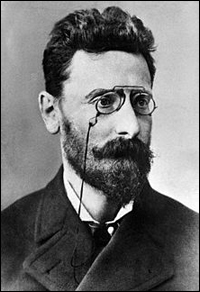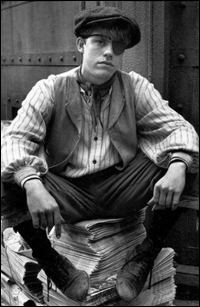
*
Ask Playbill.com answers your (and sometimes our own) theatre-related questions. To ask a question, email [email protected]. Please specify how you would like your name displayed and please include the city in which you live.
Question: The chief antagonist in the new musical Newsies is newspaper publisher Joseph Pulitzer, who tried to break the newsboy strike. How much of the conflict depicted in the show is based on truth?
Villains in Disney stage musicals are usually pretty cartoonish. And for good reason — the shows are often based on animated features. Scar, the malcontent lion brother of the king Mufasa, is the chief baddie in The Lion King. In The Little Mermaid, it's Ursula, the sea witch. And in Beauty and the Beast, the buffoonish and bigoted he-man Gaston makes life hell for the two title characters.
Newsies, Disney's new hit-bound show at the Nederlander Theatre, is different. For one, it's based on a film that featured live actors. For another, some of those characters are based on real people. The 1899 New York newsboy strike dramatized in the show actually happened, with a pack of paper-hawking ragamuffins squaring off against powerful newspaper publishers William Randolph Hearst and Joseph Pulitzer — who is a main personage in the play and the newsboy's chief antagonist. The Tony Award nominee John Dossett plays the man whose name and career inspired the famed Prizes for writing. (The 2012 Pulitzer Prize recipients will be announced on April 16.)
| |
 |
|
| Joseph Pulitzer |
Where the plot differs is in the timeline. In the musical, Pulitzer hikes the price because sales are down since the Spanish-American War concluded. In reality, the newsboy price when up during the war, to capitalize on increased paper sales. Once the war ended, all the publishers took the price back down to 50 cents — except Pulitzer and William Randolph Hearst of the New York Morning Journal.
"Pulitzer and Hearst hated each other," said David Nasaw, Arthur M. Schlesinger, Jr. Professor of History, at the CUNY Graduate Center. Nasaw's book "Children of the City: At Work and at Play," published in 1985, helped inspire the film and the musical. "But they had to work together on this." Joseph Pulitzer, however, did not play the hands-on role in the strike that he does in Newsies. "Joseph Pulitzer had nothing to do with it, because he was out of the city," Nasaw said. "He was miserably ill."
Read more about Broadway's Newsies in the Playbill Vault.
| |
 |
|
| Kid Blink, as depicted by Trey Parker, in the "Newsies" film |
There was no strike-coverage blackout enforced by Pulitzer, as there is in the musical. There was no publisher solidarity. In fact, the situation was quite the opposite. "The World and Journal were losing their advertising after a couple days," said Nasaw. "The advertisers went to the other newspapers. And the other papers had a ball covering the strike."
In Newsies, the strike is resolved when Pulitzer brings the cost down to 55 cents for 100 papers, and agrees to buy back all the papers newsboys can't sell. (In the past, newsboys were stuck with the unsold papers.) In truth, Pulitzer only agreed to the latter issue. Plus, Pulitzer didn't actually buy the papers back; he gave the newsboys credit for the papers. "They won a strike in a way that no other unions which contested the newspapers could do it," explained Nasaw. "Just like the teamsters, later in the 1950s, the boys were the critical pathway between the newspapers and the readers."
Another fabrication in Newsies is the newsboy leader, Jack Kelly (played by Jeremy Jordan). The 1899 paperboys were led by a youth named Kid Blink, so called because he was blind in one eye. He was also known by the monikers Red Blink (he had red hair) and Muggsy Magee. He spoke in thick New York dialect — i.e., "Me men is nobul" — which made for good copy. Kid Blink was introduced at a rally at New Irving Hall on Broome Street on July 24, 1899, as "our master workman," the New York Times reported at that time. The "Newsies" film featured a minor character called Kid Blink, but the leadership duties were taken up by the fictional Jack Kelly, who had 20/20 vision.
As for other characters in the show (spoiler alert here!), Joseph Pulitzer did not have a daughter reporter, let alone one who was involved in the strike and fell in love with its newsboy leader. And while Theodore Roosevelt was indeed Governor of New York at the time, he did not get involved in the dispute. "He was certainly not going to march and align himself with Hearst and Pulitzer," said Nasaw. "They were Democrats."










